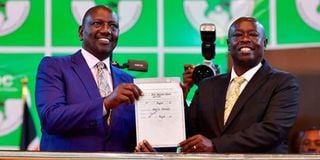Premium
A taste of power: Ruto, Gachagua already calling the shots

President-elect William Ruto and his running mate Rigathi Gachaua after receiving their election certificate at Bomas of Kenya on August 15, 2022.
President-elect William Ruto did not have to wait too long to get a taste of the trappings of power after being declared the winner of the 2022 General Election.
The law dictates that upon the declaration of the final results of a presidential election, the Assumption of the Office of President Committee shall ensure the President-elect and Deputy President-elect are accorded adequate security.
Under the Assumption to the Office of the President Act 2012, which streamlines the transfer of presidential power, public officers are compelled to share information with the President-elect.
State organs expected to brief Dr Ruto include the National Intelligence Service, the Kenya Defence Forces and the National Police Service.
GSU squad in Sugoi
After the Independent Electoral and Boundaries Commission (IEBC) Chairman Wafula Chebukati gazetted Dr Ruto as President-elect, an elite GSU squad was deployed to his residence in Sugoi, Uasin Gishu County.
The Act states: “The Committee shall ensure that the President-elect under section 9 receives security briefings from the respective national security organs.”
It further states in Article 11: “Public officers are also supposed to provide required information… A public officer who fails to comply with the provisions of this section commits an offence and is liable, on conviction, to a fine not exceeding one million shillings or to imprisonment for a term not exceeding two years, or to both.”
The assumption of office is overseen by a committee headed by the Secretary of the Cabinet and other state officials in various ministries.
The committee’s role is not limited to overseeing the transitional issues and the swearing-in ceremony but other roles, including planning security for the President-elect and his deputy.
Those in the committee are Secretary to the Cabinet Joseph Kinyua, Interior Cabinet Secretary Fred Matiang’i, Attorney-General Kihara Kariuki, Principal Secretaries Karanja Kibicho (Internal Security), Julius Muia (Treasury), Macharia Kamau (Foreign Affairs), Jerome Ochieng (ICT), Julius Korir (Devolution) and Joe Okudo (Sports).
Others are the Chief of the Kenya Defence Forces Robert Kibochi, Director-General of the National Intelligence Service Philip Kamweru, Inspector-General of Police Hillary Mutyambai, Clerk of the National Assembly, Chief Registrar of the Judiciary Anne Amadi, Clerk of the Senate, Solicitor-General Ken Ogeto and State House Comptroller Kinuthia Mbugua.
‘Deep State’
Interestingly, Dr Ruto has blamed some members of the committee of their involvement in the so-called ‘Deep State’, accusing them of crafting a scheme to influence the succession race.
He has also accused Dr Matiang’i, Mr Kibicho, Mr Mbugua and Mr Mutyambai of misusing security organs for political purposes.
This team is expected to prepare the swearing-in programme. The inauguration must be done in Nairobi and the day is a public holiday. The oath of office should be taken between 10am and 2pm.
The Act has a requirement for the handing over of instruments of power and authority, which are a sword and the Constitution. The Deputy President-elect also takes his oath into office before the Chief Justice and only then is an inauguration speech delivered by the new President.
The committee is expected to prepare and submit a report to Parliament of its activities and gazette the report after a month. What is interesting is that citizens are allowed, in public interest, to apply for any information on the committee’s workings subject to payment of fees.




